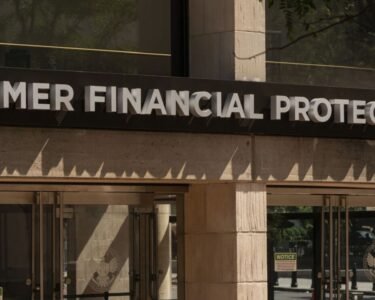
US economy masks credit crisis as debt hits millions
Despite the overall health of the US economy, there are growing concerns as Americans face record-high credit card debt.
unbranded – Newsworthy
The typical late fee on a credit card payment will drop from $32 to $8 under a new rule announced Tuesday by federal regulators.
Alleging that banks profit handsomely from excessive late fees, the Consumer Financial Protection Bureau has capped them at $8 for the largest card companies.
Regulators estimate the cap will save American families more than $14 billion a year in late fees, or $220 per year for each of the 45 million people who pay them. Banking industry leaders counter that the cap could trigger higher interest rates for those who pay their bills on time.
“For over a decade, credit card giants have been exploiting a loophole to harvest billions of dollars in junk fees from American consumers,” said Rohit Chopra, director of the federal agency. “Today’s rule ends the era of big credit card companies hiding behind the excuse of inflation when they hike fees on borrowers and boost their own bottom lines.”
The rule stems from the Credit Card Accountability, Responsibility and Disclosure (CARD) Act of 2009, which banned credit card companies from charging excessive fees, among other reforms.
A loophole allowed banks to charge excessive late fees, regulators say
Under the CARD Act, banks were supposed to charge late fees only to recover their costs in collecting the tardy payments.
But regulators left a loophole. Card issuers could skirt the rules if they charged no more than $25 for a first late payment and $35 for subsequent late fees. Inflation adjustments pushed those sums to $30 and $41, respectively.
The CFPB is now closing the loophole and eliminating future inflation adjustments for card issuers with at least one million open accounts.
The banking industry greeted the rule change with skepticism.
“Today’s flawed final rule will not only reduce competition and increase the cost of credit, but will also result in more late payments, higher debt, lower credit scores and reduced credit access for those who need it most,” the American Bankers Association said in a statement.
“The Bureau’s misguided decision to cap credit card late fees at a level far below banks’ actual costs will force card issuers to reduce credit lines, tighten standards for new accounts and raise APRs for all consumers – even those who pay on time.”
Another industry group, the Consumer Bankers Association, predicted that the rule change will “benefit a small minority of frequent late-payers” and pass on their costs to the large majority of cardholders who make their payments on time.
“The FCPB has openly conceded that the majority of cardholders will likely see their credit card interest rates increase and credit availability decrease” following a late-fee cap, said Lindsey Johnson, president of the Consumer Bankers Association.
Late fees have ballooned into a $14 billion industry, as of 2022, the CFPB said, representing more than 10% of the $130 billion card issuers charged consumers in interest and fees in that year.
The average late fee charged by large card companies ticked up from $23 in 2010 to $32 in 2022.
More on late fees: Credit card companies may waive late payment fee — but you have to ask
Card companies will still be allowed to charge fees above the $8 threshold, but only if they can prove higher fees are necessary to cover their actual collection costs.
The new rule will take effect 60 days after it is published in the Federal Register, regulators said.




